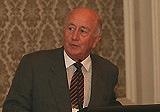Korea comes to UNSW
Senior diplomats and education specialists from leading Korean universities have met at UNSW to explore new ways to tap the growing interest in Korean studies.
Senior diplomats and education specialists from leading Korean universities have met at UNSW to explore new ways to tap the growing interest in Korean studies.

Senior diplomats and education specialists from leading Korean universities have met at UNSW to explore new ways to tap the growing interest in Korean studies.
The 4th Korea Australasia Research Centre (KAREC) International Symposium drew more than 60 diplomats and education specialists from universities across Korea and the wider Asian region to develop strategies to promote Korean studies internationally.
KAREC, a joint research centre of the Australian School of Business and the Faculty of Arts and Social Sciences at UNSW, conducts and coordinates research into all areas of Korean studies and Korea-related issues in Australia, New Zealand and South-East Asia.
In 2006 it was selected as one of four global research centres to promote Korean studies by the Korean Ministry of Education and the Academy of Korean Studies, receiving a research grant of $1.5 million.
"It was exciting to have these high-profile representatives present at the symposium," said Mack Williams, former Australian ambassador to Korea and co-chairman of KAREC's advisory board.
"Their presence will ensure the development of cooperative strategies for the development of Korean studies in the region."
Associate Professor Chung-Sok Suh, KAREC director and symposium convenor says the meeting provided a benchmark for cooperation in Korean studies research.
"The ideas generated at the KAREC symposium will be made available for other universities in the region to use in their studies," he says.
"For UNSW, we have consolidated our research networks in Korean studies and presidents and vice-presidents of eight leading universities in the region have joined KAREC's advisory board to establish a strategic plan to strengthen research ties over the next two years."